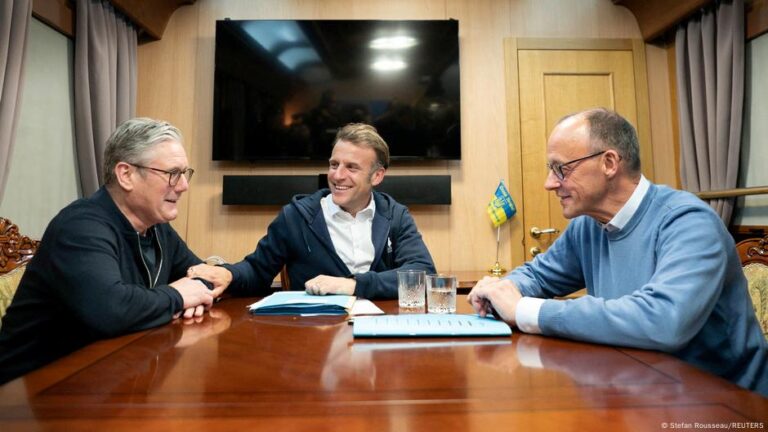Germany has had an official friendship with France for more than 60 years in the form of the Elysee Treaty. Now there is also one with the United Kingdom— the first comprehensive bilateral treaty between the two nations since the end of the Second World War.
Above all, the treaty signed on Thursday provides for close security and arms cooperation, including mutual assistance obligations in the event of a crisis, though this is something that has long existed within NATO.
A few days before German Chancellor Friedrich Merz signed the treaty in London, French President Emmanuel Macron and his wife Brigitte also paid a state visit to the UK that lasted several days, including a carriage ride with the royal couple and a state banquet. Their visit, too, was primarily about the security of Europe’s two nuclear powers.
Merz, Macron and British Prime Minister Keir Starmer also traveled together on a train to Kyiv a few weeks ago to assure Ukraine of their continued support. Photos from the trip show the three of them in relaxed and informal conversation. Polish Prime Minister Donald Tusk joined them after taking another train.
An alliance born of necessity
“E3” is the relatively new acronym for the cooperation between the three major western European nations of Germany, France and the UK. Although France and Germany are already close partners within the European Union, the UK has been on the sidelines since Brexit, when it withdrew from the 27-member political and economic union.
But these differences have been set aside to address two pressing issues: the threat from Russia and uncertainty over whether US President Donald Trump would back European NATO states in the event of war. The nuclear deterrence of France and the UK, as Merz has repeatedly hinted, could supplement US protection for Europe, and perhaps even replace it in the longer term, should Washington turn its back on Europe altogether.
Merz: ‘We were free-riders’
Merz’s inaugural visit to Washington in June was generally deemed a success, and his joint press appearance with Trump went off without exposing any major rifts. By contrast, Trump and Vice President JD Vance had snubbed Ukrainian President Volodymyr Zelenskyy in front of cameras in the Oval Office in February. The scene appalled Merz at the time.
Merz said little at his press conference with Trump and appeared to be nervous, while Trump talked all the more. The chancellor mainly promised more defense spending, and the US president seemed satisfied.
“Trump is not interested in partnership, but in vassalage,” University of Halle-Wittenberg political scientist Johannes Varwick wrote to DW.
Immediately after his election victory in February, Merz said that Europe should “achieve independence from the US” in terms of defense policy.
But this is unrealistic, said Henning Hoff from the German Council on Foreign Relations (DGAP). “In view of Europe’s great dependence on the US in terms of security policy, openly turning away from Washington would be reckless and unwise,” he wrote to DW.
Varwick concurs: “There can be no question of independence,” either politically or militarily, he wrote.
In London, Merz hinted that while security cooperation with the UK can supplement the US defense guarantee, it could be no substitute. In a BBC interview, the chancellor also agreed with the US President when it came to European defense spending: “We know that we have to do more on our own and we have been free-riders in the past,” he said. “They are asking us to do more, and we are doing more now,” he added, referring to Germany’s new plans to massively increase its own defense spending.
Border controls strain relations with Poland
Merz, who heads Germany’s conservative Christian Democratic Union, repeatedly accused the previous government under center-left Social Democrat Olaf Scholz of neglecting relations with France and Poland. Immediately after taking office in May, Merz traveled to Paris and Warsaw to signal how much he values these two European partners.
He appeared to instantly forge a cordial understanding with Macron, but there were tensions with Polish Prime Minister Donald Tusk after Berlin introduced border controls with its neighbor to prevent illegal entry. Poland does not want to take back migrants and is also now controlling its border with Germany.
The border issue was a “false start,” said the DGAP’s Henning Hoff. “Because symbolic migration policy was more important to him than European cohesion and good neighborly relations with Poland.”
At the press conference with Starmer in London, Merz emphasized that the tripartite cooperation was not exclusive: “We’re always bearing in mind Poland, Italy and the other also smaller European partners in whatever decision we take,” he said.
Nevertheless, the journey that Merz, Starmer and Macron took together to Kyiv—without Tusk or Italian Prime Minister Giorgia Meloni—was symbolic. And so far the new formula for security policy cooperation is E3, not E4 or E5.
This article was originally written in German.


